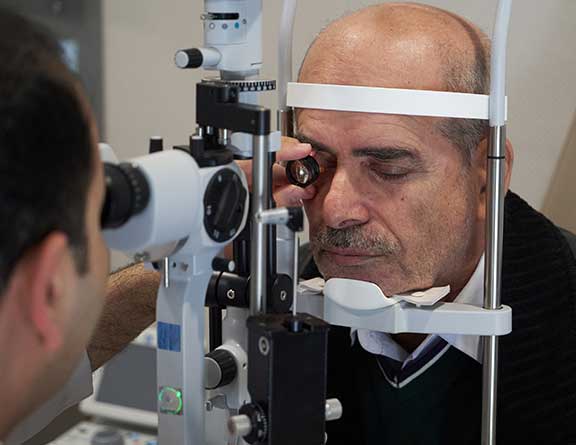
Vijayawada
USFDA-Approved Procedure
Support in Insurance Claim
No-Cost EMI
Same-day discharge
| Type of Cataract Lens | Correction | Limitation | Popular Cataract Lens Brand | Cost (In Rs.) |
|---|---|---|---|---|
| Monofocal Lens | Usually Distant Vision | Requires glasses to see near objects | J&J, Medinnium, Abbot/Alcon, Aurolab, Bausch & Lomb, etc. | Rs. 18,000 to Rs. 50,000 approx. |
| Multifocal Lens | Distant & Immediate | Glasses Required for reading only | Abbot, Zeiss, Alcon, Care Group, etc. | Rs. 30,000 to Rs. 90,000 approx. |
| Trifocal Lens | Distant, Far, & Immediate | None | Alcon, Zeiss, Care Group, Bausch & Lomb, etc. | Rs. 30,000 to Rs. 70,000 approx. |
| Toric Lens | Correction of Cylindrical Power | None | Alcon, Abbot, J&J, Aurolab, Zeiss, Bausch & Lomb, etc. | Rs. 30,000 to Rs. 70,000 approx. |
A cataract is an eye disorder characterized by the clouding of the natural eye lens. The lens has proteins and fibers in the eye that are clear and allow the passage of light. With age or due to some other reason, like injury, diabetes, etc, the proteins and fibers may start to clump together, resulting in the clouding of the lens.
This will prevent the light from passing through the eye lens and affect vision. If not addressed on time, the clouding will continue to progress, and the patient may risk blindness. The only treatment for cataracts is undergoing cataract surgery.
If you or your elder ones are suffering from cataracts, get in touch with us to undergo safe and cost-efficient surgery in Vijayawada. Pristyn Care provides minimal pain cataract surgery by some of the best cataract surgeons. Call us to book a quick appointment with highly reputed eye specialists near you. There are no medicines that can cure cataracts or slow down their progression. Ultimately, you will need surgical removal of the clouded lens. So, if your vision is becoming foggy or blurry, get in touch with Pristyn Care and undergo cataract surgery in Vijayawada, as it is the only effective treatment.


Cataract Surgery- Diagnosis and Treatment
To identify the severity of the condition (grade of cataract), the doctor examines the eye physically. For an accurate diagnosis, the doctor will recommend the following tests-
Through these examinations, the ophthalmologist determines to which extent the cataract has progressed and what would be the best technique to remove it.
The different types of cataract surgery are explained below-
The most suitable technique for cataract removal is chosen after diagnosing the patient’s condition. At Pristyn Care, we leverage all these techniques depending on the patient’s condition.
The cataract surgery procedure is carried out in the following steps-
In general, the procedure remains the same
Consult the Best Ophthalmologist Near you
At Pristyn Care, we leverage traditional and modern techniques to remove cataracts safely. The technologies used are phacoemulsification, Femtosecond Laser-assisted surgery, Microincision cataract surgery, and others as required.
We use Indian and Foreign intraocular lenses to ensure our patients get the best options. We also have lenses of popular and reliable brands with various features and functionalities suitable for the patient’s needs.
Pristyn Care has a dedicated team of ophthalmologists with more than 10+ years of experience and specialization in performing different types of cataract surgery with a success rate higher than 95%.
We provide a detailed recovery guide and multiple post-surgery consultations to the patients without additional charges. The goal is to ensure that the patient’s eye recovers properly after the surgery.
Here are some factors that can help you choose the best cataract surgeon in Vijayawada –
There are various factors that are usually considered while calculating the overall cost of cataract surgery in Vijayawada. These factors include- Choice of the hospital for cataract surgery in VijayawadaThe technique used for cataract removal Type of IOL (intraocular lens) chosen for replacement Diagnostic tests and evaluation of the eyes Hospital or clinic related expenses Post-surgery care and support Follow-up consultations Each of the above-mentioned components has either a major or minor impact on the cost. To get a closer estimate, you can call Pristyn Care and talk to our medical coordinators.
Cataract surgery is covered by all health insurance policies and costs around Rs. 35,000 to Rs. 1,00,000 approx. These are some terms and conditions that may vary from one insurance company to another. Many plans have a waiting period before they will begin to cover the costs of the surgery, so it is important to plan ahead before going for cataract treatment in Vijayawada. Therefore, it is always advised to talk to the insurance provider beforehand and have a clear understanding of the terms and conditions.
The foods that a person should avoid after cataract surgery include refined carbohydrates and items that are high in sugars, such as packed juices, bread, cakes, pastries, pasta, cereals, chips, etc. You should also avoid eating foods that have high sodium levels, fried foods, and highly processed foods.
Blurry vision is a common side effect of cataract surgery which is likely to improve within 24-48 hours after the surgery. The vision will improve in the next two weeks as the eyes fully adjust to the newly implanted intraocular lenses.
The best lens for cataract surgery will depend on the patient’s vision and refractive errors that need to be corrected. While monofocal lenses are the ones that are most commonly used, some patients may benefit from other types of lenses. So, while you are choosing the lens, consider the following factors-
Talk to your eye doctor and discuss which type of lens can give you more realistic results in terms of vision improvement. You can book a quick consultation with Pristyn Care doctors to get advanced cataract surgery in Vijayawada.
The vision quality improvement after cataract surgery is subjective to the patient’s eye health. Generally, cataract surgery outcomes are focused on the visual acuity and refractive status of the patient after the treatment.
Typically, the vision restoration is the same as before the cataract started developing in the eye. If you had refractive errors before cataract development, the vision would still be blurry. However, if you choose to get premium cataract lenses that address refractive errors, you will notice a major improvement in your vision quality.
The cataract doctor will guide you at every step during the cataract treatment. The doctor will explain what the surgery entails during the initial consultation and prepare you mentally. Other preparations that are generally done before cataract surgery involve the following-
On the day of surgery, the doctor may also ask you to avoid eating and drinking anything 6-8 hours prior to the surgery.
There are no studies that help to prevent cataracts. However, doctors usually suggest some things that make it possible to detect cataracts at an early stage and improve overall eye health. These things include-
The cataract grading system is the metric used to determine the severity of the condition. For each type of cataract, the grading system is slightly different.
During the recovery period, the patient is instructed to follow some tips that are essential to ensure a faster and smoother recovery. So, here are some dos and don’ts that you should follow after cataract surgery.
Dos
Don’ts
Some common cataract surgery complications include-
Other than these, other more serious complications can also arise if the patient fails to care for the eyes. The serious complications include-
There are many misconceptions about cataract treatment. The most common is that cataracts can be treated or managed with eye drops. However, the eye drops available at pharmacies and medical centers are not effective in managing cataract symptoms or reversing the condition. The only cure for cataracts is surgery.
Generally, doctors suggest that maintaining a healthy lifestyle and taking good care of the eyes can slow the progression of cataracts. However, there is no evidence that proves this theory. The right approach for cataract treatment is looking out for problematic symptoms and undergoing cataract surgery at the right time. Typically, eye specialists recommend cataract surgery before the condition reaches the hypermature stage.
Pristyn Care simplifies the surgical journey of the patient and provides comprehensive care from the start to the end. In addition, we provide services that are beneficial for the patients, including-
After the cataract surgery, you can watch TV right away. However, things may look blurry at first but cloudy vision subsides soon. It may take 1 to 3 days for most people to return to work or a normal lifestyle with certain precautions and eyeglasses, especially for reading. Contact your cataract surgeon in case you experience any difficulty or strain in the eyes after your surgery.
A mature cataract is denser than an immature cataract. The symptoms involve blurry vision, double vision, glares, and halos around the light sources. An immature cataract only causes minor vision problems and doesn’t affect the quality of the life of the individual. Mature cataract symptoms are much worse and very likely to affect the individual’s quality of life. Even reading becomes difficult when the cataract matures. Cataract surgery is usually recommended at this stage.
After a thorough and comprehensive eye evaluation, Cataract surgeons at Pristyn Care come into the play. Doctors will discuss with you the diagnosis of cataract because this will help them to judge for glasses or surgery. In the absence of any eye disease that may affect your vision, the eye surgeon will discuss with you the possibility of cataract surgery in Vijayawada, and its available techniques.
If you have been diagnosed with any type of cataract, get in touch with Pristyn Care and discuss the treatment options. In Vijayawada, we provide advanced cataract treatment using MICS and FLACS techniques. Being one of the leading healthcare providers, we ensure that our patients get best-in-class treatment at cost-effective prices.
We are partnered with the best cataract hospitals in Vijayawada that have the latest USFDA-approved surgical and diagnostic tools. Our doctors are well-versed in all types of cataract surgeries and have specialized training in minimally invasive procedures. You can rest assured knowing that the surgery will be performed by highly experienced cataract surgeons. Pristyn Care takes care of every aspect of treatment and provides assistance throughout the journey for a hassle-free experience.
.svg)
.svg)
.svg)